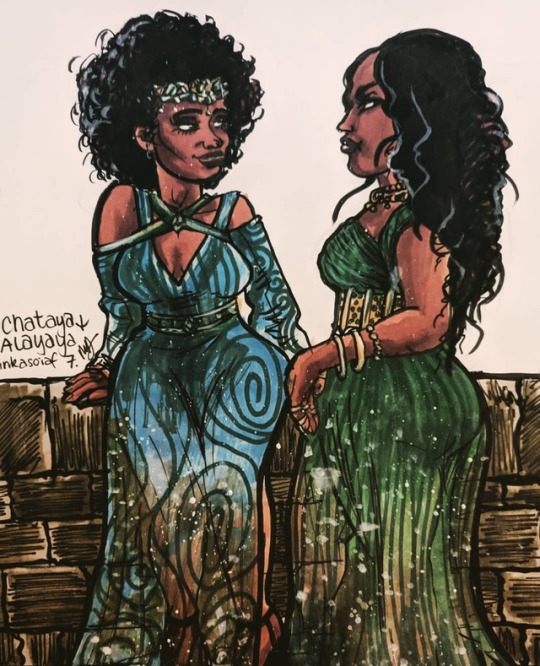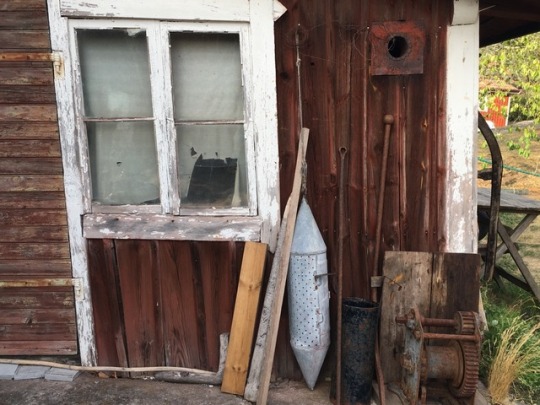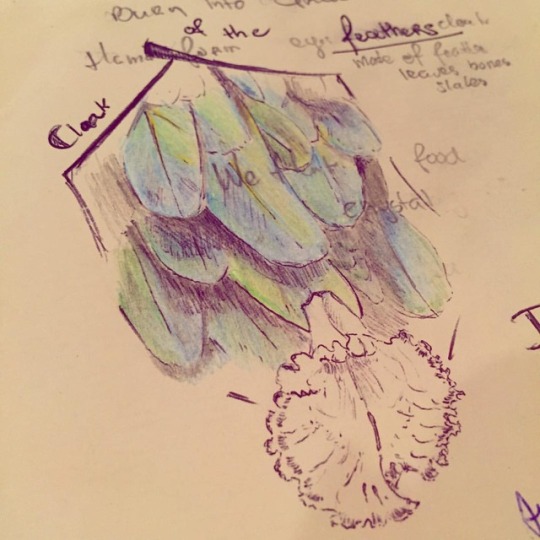#summerislands
Text
"Embora duas dezenas de deuses tanto grandes quanto pequenos sejam honrados nas Ilhas do Verão, a reverência especial é mostrada aos deuses do amor, da beleza e da fertilidade. A união do masculino e do feminino é sagrada para essas deidades; ao se juntarem nesse ato de adoração, os ilhéus acreditam, homens e mulheres honram os deuses que os fizeram. Sejam ricos ou pobres, homem ou mulher, de nascimento nobre ou humilde, todos os ilhéus do Verão devem viver um tempo nos templos do amor que pontilham as ilhas, e partilhar seus corpos com qualquer um que possa desejá-los." - O Mundo de Gelo e Fogo // Além das Cidades Livres: As Ilhas do Verão
🎨: Marc Simonetti

1 note
·
View note
Photo

Hello everyone and happy Friday! Today is sadly the last day of my holiday and I’ll be back on that sleeper train home tonight 😟 (Scotland always has my soul though 😉😂) Summer Island was bought for me by my lovely sister @chrissireads in our quest to read Kristin Hannah’s back catalogue together. Sadly it left me with quite disappointed. It was incredibly predictable and I never felt connected to the characters at any point! 😬 Moving Parts was my next acquisition from one of my new favourite publishers @tiltedaxisbooks it’s described as surreal and puncturing short stories from the Thai master of the form. In a pink-walled motel, a teenage sex worker brings a grown man to tears. A love-struck young boy holds the dismembered hand of his crush, only to find himself the object of a complex ménage à trois. A naked body falls from the window of a twenty storey building, while two female officer-workers offer each other consolation in the elevator. Sounds right up my street!! Finally, I preordered Reputation as I loved Anatomy Of A Scandal by Sarah Vaughan so much! It follows a politician whose less than perfect personal life is thrust into the spotlight when a body is discovered in her home. 😳 I’d love to know your thoughts on any of these books or authors. Let’s have a chat in the comments! #bookstagram #scottishbookstagrammer #bookhaulheaven #newbooksplease #kristinhannah #summerisland #movingparts #tiltedaxispress #booksintranslation #prabdayoon #muipoopoksakul #reputation #sarahvaughan #lovenewbooks #booksimexcitedabout https://www.instagram.com/p/ClY8rACLJei/?igshid=NGJjMDIxMWI=
#bookstagram#scottishbookstagrammer#bookhaulheaven#newbooksplease#kristinhannah#summerisland#movingparts#tiltedaxispress#booksintranslation#prabdayoon#muipoopoksakul#reputation#sarahvaughan#lovenewbooks#booksimexcitedabout
0 notes
Photo

#inktoberofthrones2k18 #inktober2018 Chataya and Alayaya requested by @BettyNueve on twitter #asoiaf. . . #sanrixian #chataya #alayaya #inktober #dailydrawing #traditionalart #pendrawing #brushandink #summerislands https://www.instagram.com/p/Bo0bBopH-PY/?utm_source=ig_tumblr_share&igshid=30ql6kpc0rkb
#inktoberofthrones2k18#inktober2018#chataya#alayaya#inktober#dailydrawing#traditionalart#pendrawing#brushandink#summerislands#fanart#game of thrones#dawn age#age of heroes#targaryen#stark#inktober2017#westeros#essos#A Song of Ice and Fire#ASoIaF#sanrixian
72 notes
·
View notes
Photo

Naxos Is The Way! 🤍💕 Awesome Vacation Option 🤍🤍 DM Me for a better price or @konstantinossofikitis by Say RIA #naxos #summerbreak #vacation #vacations #bestvacationspix #travel #SummerVacation #summervacations #summervacationlove #summerbreeze #summerisland #sun #sea #summersea #summertime #mysummer #mysun #greece #blusea #blusky #Relax #summervibes #blueseas #relaxsea #instasea #sealovers #beachyoga #beachyogagirl #travelingyogi #yogainspirations (at Καστράκι , Νάξος) https://www.instagram.com/p/CCi1JtmBJLj/?igshid=1liwpdh2df9ea
#naxos#summerbreak#vacation#vacations#bestvacationspix#travel#summervacation#summervacations#summervacationlove#summerbreeze#summerisland#sun#sea#summersea#summertime#mysummer#mysun#greece#blusea#blusky#relax#summervibes#blueseas#relaxsea#instasea#sealovers#beachyoga#beachyogagirl#travelingyogi#yogainspirations
1 note
·
View note
Photo

August 05, 2018
4 notes
·
View notes
Text


Mulheres do mar + Chuva de diamantes.
summerisland.
#seulrene#capa de fanfic#capa para fanfic#luvies design#capa de spirit#capa clean#red velvet#irene#seulgi#joohyun#capa divertida#spirit fanfics
50 notes
·
View notes
Photo

#fiftyshadesofblue #barbados🇧🇧 #beachsunrise #yasawaislands #summerisland #sunsetatthebeach
0 notes
Photo

#sizdengelenler @kubrickyuksel #bozcaada #serenity 🐚 . . . . . . . . . . #summer #time #vacation #island #islandarchitecture #islandstyle #islandstreet #summerisland #çanakkale #çanakkalebozcaada #türkiye #turkishislands #turkishcoast #turkishstreet #summer2018 #peace #peacefulstreets #peacefulplaces (Bozcaada, Çanakkale) https://www.instagram.com/canakkalelife/p/BwzLBZSnaN3/?igshid=c2ijzyyqe2v4
#sizdengelenler#bozcaada#serenity#summer#time#vacation#island#islandarchitecture#islandstyle#islandstreet#summerisland#çanakkale#çanakkalebozcaada#türkiye#turkishislands#turkishcoast#turkishstreet#summer2018#peace#peacefulstreets#peacefulplaces
0 notes
Photo

Yesterday, Le Méridien Hotels reminded me that travel is all in your mind (well, in many ways at lest). So even if stuck in London for now, one can always #escape ;) ⠀ Check the link in my bio and share some love if my Rouge&Blues theme takes you places☝️⠀ . ⠀ #LeMeridienAwayWeGo #Zakynthos #thegreekescape #summerisland #lovesummer #rougeandblues (at Zákynthos, Zakinthos, Greece)
2 notes
·
View notes
Link
Like much folk horror, The Wicker Man first appears to be a rural exploitation story in which an urbanite stumbles across a backwater burg where society’s standardized pieties aren’t observed. But it twists into a story about how useful a naive scapegoat—the “fool,” as Howie is positioned by Summerisle—can be in keeping the pitchforks pointed down at the land and never up at the landowner. Whether Lee’s character buys into his folksy, back-to-the-land heresy is irrelevant. For all his rituals and ceremonies, he remains gentry. This is what governs his actions, and what seals Howie’s fiery fate.
In Ari Aster’s Midsommar (2019), a group of curious American millennials decamp to a remote Swedish hamlet for a highly Instagrammable solstice festival (think Maypoles, peasant dresses, flower crowns, and all the other summery, Coachella-chic accoutrements). In Wicker Man fashion, their arrival is more auspicious than it initially appears, as they end up embroiled in a conspiratorial pagan plot, unfolding against the ceaseless daylight of the Scandinavian mid-summer. Even before Midsommar, the ideas and imagery of The Wicker Man have sprouted up across the landscape of contemporary horror cinema, tapping into fears about manipulation, xenophobia, urban-rural divides, crowds gone mad, post-truth epistemology, and a lurking sense that personal agency is illusory, with the actions of the individual governed by forces that are (or are presented as being) beyond our ken.
In Folk Horror: Hours Dreadful and Things Strange, Adam Scovell identifies isolation, landscape, skewed morality, and a happening/summoning (often in the form of ritual sacrifice) as the four links in the “folk horror chain.” In Robert Eggers’s The Witch (2015), a family of seventeenth century Puritans banished from their New England village must carve out their place in a hostile, unforgiving landscape. Crops fail, family members disappear, livestock is unsettled, and adolescent girls fall prey to the hysterical throes of puberty. In Eggers’s film, it’s as if nature—that immortal “devil’s playground”—is avenging itself on the colonizers who came to tame it.
...In contrast to horror films that teach us to fear Satanists simply because they are Satanists (Rosemary’s Baby, The Mephisto Waltz, House of the Devil), The Wicker Man and its progeny force us to reckon with the deeper implications of the hooting-and-hollering heretic cabal. Folk horror may be best distinguished not by its mere depiction of Satanists, pagans, witches, buxom nudes wreathed in summer garlands, but by the manner in which they pose threats to our fundamental beliefs. Unlike most horror, in which an interloping monster is either destroyed (in order to purge a threat to an established order) or otherwise incorporated into that order, folk horror operates by implicating the viewer in the dissolution and destruction of that order.
...The first wave of folk horror crested during the waning of a vital counter-culture that had wholesale rejected long-held beliefs about social order, gender, sexuality, and imperialism. If 1968, the year Witchfinder General was released, marks the beginning of the folk horror cycle, it also marks the moment where utopian visions of social revolution were abandoning a politics of collective liberation and ceding to New Age philosophies of personal transformation. The genre’s development maps onto the what Scovell describes as “a backdrop of confident optimism disintegrating impossibly quickly into a nihilistic pessimism.” The films crack open the space between the promise of Paris 1968 and the repression of Kent State 1970, between the dream of Woodstock and the nightmare of Altamont, between The Beatles and Black Sabbath.
Folk horror’s original social context saw the energy animating the 1960s collectivist repudiation of traditional values fizzle and fade into the following decade’s interest in esotericism, astrology, and the occult. Some hippies who suspected that the existing social order could not be willed away with songs about peace and love reasoned that they could at least build their own Buckminster Fuller-style domes and settled into agricultural communes to experiment with pantheistic spiritualties.
...While The Wicker Man’s viewers are not exactly invited to cheer as Howie burns, the merry music and free love of the Summerislanders does seem more fun than the dour abstention of the film’s ostensible protagonist. Teenage daughter Tomasin’s entry into the forest at the end of The Witch is also treated with similar ambiguity. The witches’ coven is both a source of fear for the viewer and freedom for the character, who after accepting the enticing offer of a talking goat—“Wouldst thou like to live deliciously?”—gets to literally fly away from her overbearing, repressive family.
The overlapping intention here is not mere proselytizing, or preaching the ethical superiority of some alternative, some hippy-dippy, left-liberal, or openly Satanic worldview. Indeed, some read the end of The Wicker Man as a defense of Howie’s beliefs (a reading encouraged by the rictus grinning Summerislanders who gaze upon his burning body, joined together to sing some sinister folk shanty). But finding horror in the space between opposing belief systems, rather than in the content of belief systems themselves, allows these films to appeal both to the permaculture-curious anarchist sporting a “Cops for Crops” back patch and the Christian viewer scared of the Beltane-observing freaks who hate their un-freedom.
A 1998 reappraisal of The Wicker Man in a Scottish broadsheet identified the shifting appeal of a film that, since its release, was regarded as little more than a relatively obscure Brit-film cult classic:
Now, as demonstrated by the enthusiastic remarks of a group of New Age twenty-somethings with Celtic tattoos (that’s Celtic with a hard C, folks) and faces full of ironmongery, The Wicker Man has become keenly appreciated not only by mainstream film buffs and horror hounds but by people who find it a vindication of their own mystical beliefs. It is as though a movie of The Diary of Anne Frank were to become a hit with Nazis, who’d come along to cheer the feel-good ending when the storm troopers haul the Frank family out of the attic.
It’s a sarcastic quip that probably seemed absurd at the time, invoking a comparison so far outside the sphere of consensus that it’s easy to brush off as a harmless joke. But it seems, like so many historical absurdities, considerably less funny now, as white supremacist attacks on synagogues and racially motivated murders regularly dominate the fickle news cycle. The surge of blood-and-soil, volkish fascism in North America makes the counter-cultural embrace of folk horror antagonists seem more deeply uncomfortable, especially when groups like the Soldiers of Odin and the Wolves of Vinland incorporate runic symbols and pagan iconography that seems culled from some hard-bound Compendium of Folk Horror.
In Gods of the Blood: The Pagan Revival and White Separatism, Mattias Gardell argues that during the 1990s, Ariosophic occultism and Norse heathen religions like Asatru overtook Christian Identity as the spiritual dimension of the white supremacist movement. This might seem like a crude projection of the fears of the present onto the films of the past, demanding a revision of that old Mark Twain quote: “To a man with a Hammer film, every nail driven into the palms of a scapegoat looks like brigades of /pol/ cybernazis unleashing Pepes of pestilence to trigger the libs.” But the association between the appeals of paganism and fascism was not lost on The Wicker Man helmer Robin Hardy, who in a 1979 interview was quoted as saying: “It was no accident that Hitler brought back all those pagan feasts at the Nuremberg rallies. The ovens would be lit later.”
Such evaluations may be reasonably deemed a little suspect; like a variation of the internet-favorite Reductio ad Hitlerum fallacy, in which the themes of Hardy’s film gain consequence in their evocation of the world-historic cataclysm of the Holocaust. But they gain a renewed (and again, sinisterly absurd) significance in the present moment, where symbols of paganism and white nationalism are being revived not only in conspicuous tandem, but confused confluence. In place of a more conspicuous swastika, a more obscure runic symbol—a Celtic cross, Thor’s hammer, the German Wolfsangel—will suffice. Once again, the symbols and regalia of the past (be it the imagined distant past of pre-Christian heathenry or the more recent past of the Third Reich) are being revived. We live in an age where, ludicrous as it may seem, certain viewers may well cheer the Nazis hauling Anne Frank out of her annex.
...At its core, folk horror is speculative fiction about the failures of the Age of Enlightenment. In Tentacles Longer than the Night, Eugene Thacker explains how the universal maxims of Enlightenment thinkers are conditional. Kant’s categorical imperative requires one to act “as if” the values dictating their actions are universally valid. In supernatural horror, the conditions of this logic are violated by the appearance of some entity that threatens the anthropocentric view of the world, evoking terror from the knowledge that Enlightenment rationality is bumping up against its limit.
Folk horror, by contrast, inverts rather than negates Enlightenment philosophy: the mob sacrifices the individual, peasant superstitions supplant science and reason as the true source of knowledge, a holistic and animistic conception of the universe overtakes an atomistic and mechanistic one. The genre presents a return of these things that had to be repressed in the transition towards a rational, individualistic, and ultimately capitalist social order: witchcraft, female empowerment, sexuality, and an organismic, earth-based conception of the universe.
Here the idea is not so much that logic and reason have reached some natural limit, but rather that the promises of the Enlightenment are always provisional, subject to revocation following one too many bad harvests. Again, the ideological structure may seem warped and inverted, but it possesses an internal, contingent consistency. The death of Sergeant Howie turns the standard horror trope of sexuality and impropriety leading to death on its ear. Unlike the many slain corpses stacked elsewhere in the horror genre, Howie’s sin is precisely his dopey virginity and piousness.
For all its dabbling with the supernatural, the folk horror genre is ultimately one rooted in materialism. The landscape holds considerable power over its people, but not in a mystical way. Allan Brown argues that The Wicker Man specifically can be read as a sci-fi story about technological failure—without the barren fruit trees caused by the poor performance of Lord Summerisle’s experimental botany, no sacrifice would be needed. If the Enlightenment philosophy that provides the grounds for contemporary liberalism involves a faith in humanity’s ability to transcend material conditions, to behave as if laws were universal and human ingenuity had no natural limits, then The Wicker Man brings us back down to earth, and we are reminded of the material conditions that make modern society possible.
Chained up in the wooden structure, Howie attempts to reason with the Lord:
Your crops failed because your strains failed. Fruit is not meant to be grown on these islands. It’s against nature. Don’t you see that killing me is not going to bring back your apples? . . . Don’t you understand that if your crops fail this year, next year you’re going to have to have another blood sacrifice? And next year, no one less than the king of Summerisle himself will do.
In this moment, Adam Scovell argues, the film is “laying down the law/lore of folk horror; that fear supplanted into communities comes back to haunt those who sowed its first seeds.” Burning to death, Howie calls out to his Christian god; the villagers sing and dance as they offer him up to their pagan lords. The viewer may feel that Howie is right, the apples won’t come next year, but the horror comes from the realization that Summerisle is also right: the sacrifice will be accepted.
Like the detestable vogue in white nationalist movements, which cop their iconography and philosophy from the rubbish heap of some imagined pre-Christian, Aryanist past, the renewal of folk horror (particularly in the American context) speaks to an unsettling truth, festering in contemporary political and cultural life. The return to symbology of Neo-Paganism, or the back-to-the-land return to the supposed “realness” inherent in far-off solstice festivals (an attraction of authenticity alluring the lambs of Midsommar), suggests not so much an antidote to the cult of Enlightenment rationality as its uncanny complement. Think only of Julius Caesar himself, whose grisly imagery of human bodies crammed into a flaming wicker statue was utterly self-serving: casting Gauls and Celts as paranoid pagans in order to justify their slaughter and conquest at the tips of legionnaires’ spearheads.
The horror latent in folk horror, then as now, is not an abject fear of pagans or free-loving hippies or straight-up Satanists. It’s the unsettling knowledge that the people are often all too willing to trade one form of power and subjugation for an aesthetically different manifestation of those same conditions, if only to restore faith in power itself. Even if the crops continue to fail, and the heathens of Summerisle never again taste a locally sourced organic apple, it doesn’t matter: the sacrifice succeeds. Killing Howie need not bring back the damn apples themselves, so long as it restores faith in ritual, mysticism, heathen magick, and the other counter-Enlightenment energies that Lee’s Summerisle, in all his sinisterness and sartorial preposterousness, wields in a perverse seasonal pageant, all undertaken to consolidate his own power: as gentry and patriarch, one Lord substituted for another.
#I love this#like the end of the witch is thrilling and seemingly and maybe to an extent actually liberatory but also like tomasin's escaped one horrible#situation to now be in a seemingly better one but even there she'll be under the thrall/control of black philip or w/e so she isn't truly#free or in control of her own destiny#but all the ideological collisions and the inadequacy of colonial new england puritanical insanity#or modernity & the trappings of western/christian civilization as embodied by the wicker man guy#ie general bourgeois liberal enlightenment values being seen as the highest/most ideal form of living/thinking#in providing actual meaning/freedom for the people living under it makes them prone to being overtaken by like an insane death cult which#may have some aesthetic differences + some differences in lifestyle which are genuinely more appealing/fulfilling in certain ways but#ultimately still hold everyone under the domination of an unchallenged power structure#same with the impotence of contemporary liberal multiculturalism when it comes to actaully reckoning with the historical legacy/contemporary#impact of a racist society as seen in get out#and on and on#essays#*
67 notes
·
View notes
Photo

Cloak of the feathers #draw #sketch #cloak #summerislander #feathers #turquoise #aquamarine #cyan #blue #green
3 notes
·
View notes
Text
Chad Summerislanders vs. Incel Harga
8 notes
·
View notes
Text
Parrots and surprises
This morning when I entered in the dining room after a guard announced me, I saw that I was the last person to wake up, everybody was already here : my father and the 4 Velaryon. The last sit was just beside Daemon. I was terrified and seriously considered to go back to my apartments and ask for breakfast in it... But why? I didn’t even know it... I decided to face him and I proudly walked toward him and sat on the ivory chair. I felt his look on my profile. I just couldn’t look at him so I served myself some mango and red juice, ignoring him. When my father finished his conversation with Lord Velaryon, he asked me :
- So, my Keithia, what are you going to do today?
- This morning, I have class with Bronn, my teacher from Westeros, I added to the Velaryon, and then, I will practice archery, like every morning. I don’t know yet what I am going to do this afternoon after lunch.
- Maybe you could bring our 2 young friends, Lord Daemon and Lady Elaena to the beautiful places of our island?
- It would be great I guess, quietly said Elaena - which was a great manifestation of enthusiasm - and she looked at me, waiting for my response.
- Sure, with pleasure, I answered her.
- Daemon will come too, she added, without consulting him before.
I risked a look in his direction. His face, as always, was unreadable. The rest of the breakfast went pretty normal. I went to my apartments find my bow and some arrows. Then Elaena and Daemon joined me outside in front of the palace, because they wanted to follow me the entire day. 6 guards had to accompany us.
- Do you see the colored birds that are flying there ? I asked them. They nodded. We are going to their forest. It’s really not dangerous, I added, seing a Elaena and Daemon look each other with anxiety.
We walked half an hour to the forest. Daemon even talked to me, he said the island was beautiful, and smiled to me!
When we arrived in the forrest, we felt the humidity and the warm of the numerous trees that surrounded us.
0 notes
Text
On Choosing the “I Choose Not To”
This fantastic series of posts by @jacquez45, in which they break down all the reasons they prefer to use the Creator Chose Not to Use Warnings tag on AO3 (with an in-depth listing of things that one of their Sherlock fic contains), which came out of a long ongoing kerfuffle on @lordhellebore‘s blog in which many good points were made, well it inspired me.
I’m going to do a detailed breakdown of why I chose to use that tag for my most popular Choose Not to Use Archive Warnings fic, The Straw Man Fallacy. (Under a cut because it’s very long long and is full of spoilers for both TSMF and the original version of The Wicker Man.)
My most popular CNTOUAW fic is The Straw Man Fallacy, a Johnlock casefic-with-smut that’s a crossover with the 1973 cult horror film The Wicker Man.
In that film, a fundamentalist Christian policeman is lured to the remote Scottish island of Summerisle to investigate a report of a missing child. The entire population of Summerisle practices a form of neopaganism, and the policeman, Sgt Howie, is continually, vocally horrified by their religion, their sexual openness, and what he sees as constant blasphemy. He comes to believe the missing little girl has either been sacrificed or is about to be. The charismatic Lord Summerisle (Christopher Lee at his absolute hottest) stonewalls him and manipulates him at every turn. Eventually, it’s revealed that Howie fits three requirements for a sacrifice: he represents the Crown, he is a fool, and because of his strict religious background, a virgin. He, not the girl, is the one who gets placed in the wicker man effigy and burned to death.
The Straw Man Fallacy (which I set in the modern day, not the 1970s) is set three years after this event, when Howie’s fiancee asks Sherlock and John to investigate his disappearance. Sherlock only tangentially represents the Crown, he does a few foolish things (and he wears the costume of the Fool for a while in the town procession), and, as we find out, he is a virgin and Lord Summerisle knows this. You can see where this is heading.
But that isn’t quite where the story actually goes. Sherlock figures out that he is set up to be the virgin sacrifice - and he also realizes that someone is conspiring against Lord Summerisle and his partner, the witch priestess Miss Rose. In the pivotal scene, he offers to take on their case. He also draws on knowledge of neopagan cosmology, fertility ritual, and sex magic - so he consents to be the “virgin sacrifice!” The pivot is that he will publicly, ritually sacrifice not his life but his virginity. This will anger and draw out the anti-Lord Summerisle faction and force them to reveal their hand. Sherlock insists on the right to choose his partner, and of course he chooses John - which will give both John and Sherlock the chance to do something they’ve both wanted to do for a long time (although it is strongly hinted that Lord Summerisle himself is Plan B). Lord Summerisle and Miss Rose agree to this. John does too, after a fair amount of anger and panic.
(Sherlock has also realized that Lord Summerisle’s family and his own have a connection that he can exploit to help save himself and John. This is revealed later.)
However, there is a lot more drama to come - the antagonist is Howie’s fiancee, who converted after his death and is a LOT more overzealous than the native Summerislanders, and there is a cliffhangery standoff with John pointing his gun at her, and she with a knife at Sherlock’s throat.
It’s an eerie, suspenseful story - or at least that’s what I was trying to do - and I really want the readers, especially those familiar with the original film, to feel the danger that Sherlock and John are in from the moment they set foot on the island. I want some readers at least some of the time to wonder if Sherlock and John are going to share Howie’s horrible fate.
They don’t. In fact, the story has a romance novel HEA ending - in the epilogue, Sherlock and John return to Summerisle a year later to be handfasted (married) in a pagan ceremony with Miss Rose and Lord Summerisle officiating. The story is also meant to be funny - as the original film often is - a very dark comedy of manners and culture clash. I’m a Wiccan myself, and I first watched this movie in the company of my first coven, and absolutely nobody ever roots for Howie - the Summerislanders are much more appealing and relatable.
I also have a ritual sex/sex magic kink and a public sex kink that’s visible from space, so the ritual sex scene is meant to be hot.
So two major reasons for CNTUAW: I did not want the LACK of a Major Character Death warning to spoil the suspense, and I did not want to dither over whether the dubious consent spilled over to the level of rape (if it does, Sherlock and John are both victims - but John more so, because the plan that requires sex is actually Sherlock’s idea. Nonetheless, it IS a fuck-or-die scenario. And I did warn for dubious consent and fuck-or-die in the tags. But Sherlock and John both enjoy the experience - mutual danger kink, remember- and don’t consider themselves to have been victimized. Sherlock is, typically, proud of his own cleverness in coming up with it and overjoyed to have found a new favorite hobby. When that’s what the characters’ feelings about it are, a Rape tag does not feel right to me.)
It’s a mystery/horror/suspense story as well as being a Johnlock romance. That’s the genre - it appeals to readers who like tension and surprises, and love seeing a detective’s deductions unfold and reveal a plot with a lot of twists and turns. The story’s tags include a warning for dub-con and fuck-or-die - but CNTOUAW casts a little bit of a sinister shadow, and my use of it was fully intentional.
18 notes
·
View notes
Video
youtube
[Audio] Summer Island (여름섬) - Cosmic Love (우주인의 사랑) https://youtu.be/lo0NjWSM7J4 Artist : Summer Island Album Title : Cosmic Love Release Date : 2019.10.18 Genre : Folk [Listen here] Spotify - Coming Soon Apple Music - Melon - Genie - Bugs - Vibe - ■ Mirrorball Music http://mirrorballmusic.co.kr/ https://www.facebook.com/mirrorballmusic https://twitter.com/mirrorballmusic [포크 싱어송라이터 여름섬의 첫 싱글앨범 ‘우주인의 사랑’] 우주에서의 사랑은 어떤 모습일까 한없이 적막한 그곳에선 지구에서의 걱정은 무의미하다. 우주복 헬멧에 비추는 수많은 별들 그 무엇보다 내 사랑의 눈동자가 밝게 빛나는 밤. 그런밤이 있다면 우린 모든걸 말할 수 있지 않을까 [CREDIT] GUITAR 여름섬 PIANO 여름섬 VOCAL 여름섬 MIXING 홍기(술탄 오브 더 디스코, 사운드홍) MASTERING 홍기(술탄 오브 더 디스코, 사운드홍) #SummerIsland #여름섬 미러볼 뮤직 - Mirrorball Music
0 notes
Photo

봄을 맞이하는 마음으로 살기를 두 달째.
이러다 사월에 눈이 오고, 황사가 오고, 여전히 미세먼지가 닥쳐
화사하고 새그러운 느낌의 마음을 꾹꾹 눌러담다, 초여름에서야 펼치다가
양초의 초가 활활 타다 사그라들며 꺼지는 양 여름을 맞이하겠지
그렇지만, 연말정산의 기쁨을 드디어 누릴 수 있는 월세살이 1은
돌려 받을 세금을 생각하며 사고 싶었던 것들 101가지 중 어떤 골라 먼저 채워넣을지 궁리한다.
우선 무지를 가서 부엌에서의 불편함을 줄이고자, 볼을 살거야.
이건 확실하다.
무거운 접시와 얄상한 플라스틱 통에서 야채를 씻는 것은 힘들어.
볼을 살거야.
그리고 rinbyrin의 summerisland 이번 컬렉션을 꼭 살테야.
흰티 맛집을 두고, 매번 흰티만을 눈팅하던 한 달,
어제 흰 티와 흰 매트에 김치통을 쏟아 처참한 기분이 스쳐지나갔는데, 바닥을 쓸며 생각을 지우고 고춧가루이 남아있는지만 생각했더라지.
눈팅했던 과거도 싹싹 쓸어버리고 쟁여놓을거야.
방금 전력 차단기를 앞서 나서 고치다가
선물 받은 레드오렌지 니트에 고나서
마음에도 고가 나버렸다.
앞으로 할 일만 생각하며 등에 난 고를 잊을거야.
어쩌피 출근룩으로 애용할 친구인데, 따흐흑. 슬픈 건 사라지지 않는다.
슬픔은 마음에 오래 남아 더이상 생각나지 않을 때까지 내뱉는다.
슬픔을 청산하기 위한 할 일.
통신비와 공과금, 교통비와 신용카드 비용을 깔끔하게 털고 남은 절반을 저축하고 소비하자.
지난 달의 통신비와 공과금을 가끔 이달의 월급으로 낼 때가 있는데,
이는 공과금이 중순에 나와서 이달의 월급으로 당연히 내도록 소비 설계를 해야하는 것인지 고민이다.
생각을 정리하고 말하려 하면, 다시 그에 대한 의문이 떠오르는
이 기록의 흐름이 일관성 있다. 나의 특성인가 보다.
/사진은 다원리.
0 notes